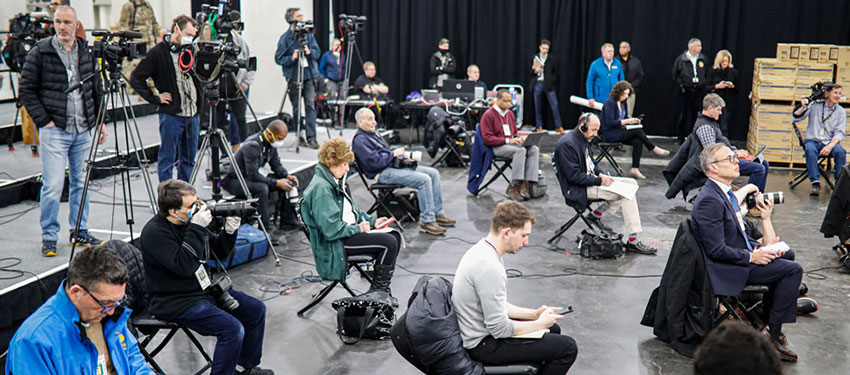By: Barbara Gutierrez
Karin Wilkins, the dean of the School of Communication at the University of Miami, arrived at her job on Sept. 1, 2019, under the threat that Florida could be hit by Hurricane Dorian, a powerful storm marching across the Atlantic that eventually decimated parts of The Bahamas.
As her second semester at the helm winds down, she is now watching the impact the coronavirus pandemic has had on her school and the University as a whole.
“I would prefer to live in less interesting times, but here we are,” Wilkins said, adding that she was impressed by how her faculty and students were able to move into online instruction without missing a beat.
“We have been engaged in physical distancing, social networking, and humanitarian connecting,” she said. “I am fortunate and proud.”
Wilkins, a leading scholar on global media who focuses on global communication and political engagement, shared her thoughts on how the COVID-19 pandemic has impacted the media industry.
Looking at how the media has covered this pandemic so far, what are your thoughts on how we can best prepare journalists for this kind of event and the world to come? How is the School of Communication poised to meet those challenges?
This has been a challenge for journalists, who themselves face challenges of working remotely, or risk physical proximity with interviews and news conferences. Moreover, some political officials are excluding key journalists from prominent news agencies from attending in person. Our news agencies also face the challenge of reporting conflicting views of the virus and about policies to support health care and prevention. This is a time when we really need our journalists and news agencies, as well as satirists and other public commentators, to understand how to evaluate credibility of evidence.
This is where communication education comes into play, with the utmost importance. It is not only our journalism program that contributes, but also our key academic programs in strategic communication, communication studies, cinema arts, interactive media, and media management. Through these programs, we educate our students to be ethical and effective communicators, cultivating abilities to consume information critically, and inspiring civic engagement with respect to diversity of perspectives and informed by global conditions. These skills matter deeply as we become faced with challenges that we never imagined.
What are some of the challenges that you see in the journalism and communication world?
Our media landscape creates challenges as we are overly saturated with information but need to be able to sort out authenticity and credibility as we make decisions about staying home, shopping safely, and supporting each other. A lack of civility in public discourse is also limiting, distracting attention from critical information. Also, we need to be quite aware of the way we talk about communities and issues, working to be respectful and compassionate, calling out prejudicial comments and hateful behaviors.
What do you think of the media coverage to date?
I appreciate the immediacy and thoughtful nature of much of the coverage, particularly the visual data presented. We have great expertise in our school to help people understand how to analyze this kind of information. The contrasts in illness progression and policies implemented is also helpful to those of us wanting to know more about proposed solutions.
There is more we could do. I would like to see more attention given to racist attacks on our Asian American and other communities. We could also know more about ways we can contribute to and support people given the terrible toll of this pandemic.
How important is a free press during this time?
Having an independent press is critical to our ability to navigate political spin. It’s also important to support diversity of perspectives, and to question assertions, through having a variety of news sources. We need independent production of news and culture to prevent the potential monopolization of communication.
What was your reaction to China expelling reporters from The New York Times, Wall Street Journal, and The Washington Post?
I find it concerning when journalists are not given access to valuable information and this is not the only case. These attempts to prevent access are indicative of the serious nature of the crisis at hand. Fortunately, we have very skilled news professionals and active global citizens working to ensure that we are able to question sources, to seek evidence, and to compose compelling narratives that matter as we move forward.







